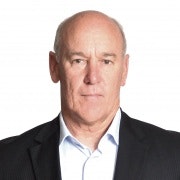QBE out of the doghouse
From doghouse to best in show. QBE chief John Neal may have been in the job less than a year but already he’s experienced the wild swings in fortune meted out by financial markets.
Late last year, the international insurance group was on the ropes. A series of hefty claims combined with a touch too much debt sent its share price plummeting, at one stage hovering just above $10.
In February, it more than halved its annual dividend to counter the weaker than expected earnings, sparking a mass exodus of yield obsessed investors.
Since then, however, QBE has outperformed the general market and its peers, and particularly in the past six weeks as the Australian equity market has gone sharply into reverse.
Neal has focussed on debt reduction, recently swapping some maturing hybrids for equity. But it is the recent shift in global markets that has breathed life back into the stock.
The very factors that have rocked the general market have worked to Neal’s advantage. Ben Bernanke may have unsettled global equity markets with the prospect of a return to more normal yield conditions. But for QBE, which derives income from US treasuries, the shift in US monetary stance couldn’t be more welcome.
Add the currency effect of a declining Australian dollar, and little wonder QBE has been on everyone’s radar.
The stock pushed above $16 earlier this month but since has retreated to around $15.50, particularly after yesterday’s earnings downgrade by AMP.
To an extent, the shudders AMP sent through the sector highlight the difficulty and dangers with comparisons to so called peer companies.
While there may be common factors, QBE essentially is a global operation while AMP, IAG and Suncorp are domestic. AMP is geared towards wealth management.
And if anything is to be taken from the AMP announcement yesterday, it is the weakness and lack of confidence that continues to undermine the domestic economy.
A rise in income protection claims hints at growing unemployment and underemployment while a fall in renewals points to the more austere mood that has settled over consumers.













